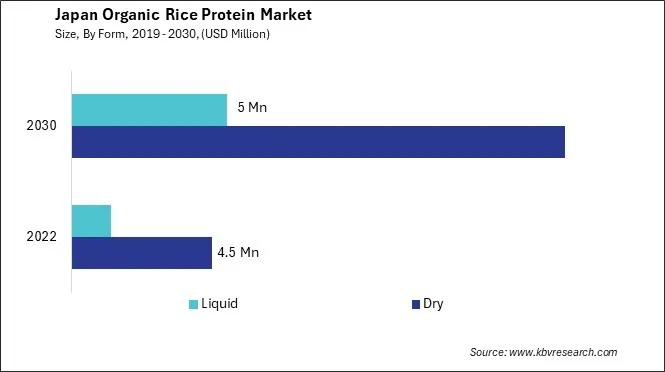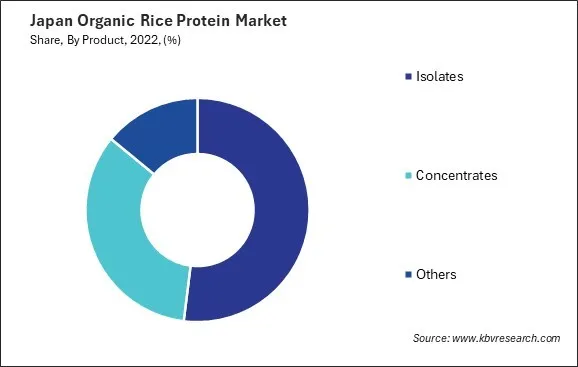Japan Organic Rice Protein Market Size, Share & Trends Analysis Report By Form (Dry, and Liquid), By Product (Isolates, Concentrates, and Others), By Application, and Forecast, 2023 - 2030
Published Date : 15-May-2024 |
Pages: 52 |
Report Format: PDF + Excel |
COVID-19 Impact on the Japan Organic Rice Protein Market
The Japan Organic Rice Protein Market size is expected to reach $20.7 Million by 2030, rising at a market growth of 17.5% CAGR during the forecast period. In the year 2022, the market attained a volume of 462.13 Tonnes, experiencing a growth of 14.5% (2019-2022).
Japan's organic rice protein market has experienced significant growth in recent years, driven by the increasing demand for plant-based protein products and a growing awareness of the health and environmental benefits of organic food. In Japan, where traditional diets often revolve around rice, the emergence of organic rice protein as a viable alternative has gained traction among health-conscious consumers. Demand for organic products has been a crucial factor contributing to the growth of Japan's organic rice protein market. Consumers are increasingly prioritizing products perceived as healthier, environmentally friendly, and free from synthetic chemicals in Japan.

As more Japanese consumers adopt vegetarian or flexitarian diets, there is a growing need for alternative protein options. Organic rice protein derived from brown rice has become popular due to its nutritional profile, including essential amino acids, vitamins, and minerals. Additionally, it is free from common allergens such as soy and dairy, making it suitable for Japanese consumers with dietary restrictions or sensitivities.
The COVID-19 pandemic has also impacted the organic rice protein market in Japan. The pandemic heightened health and wellness awareness, prompting consumers to reconsider their dietary choices. While the food and beverage industry faced challenges during lockdowns and supply chain disruptions, the demand for health-focused products, including organic rice protein, remained resilient. Consumers became more conscious of the importance of maintaining a healthy lifestyle, including consuming nutritious foods that support immune health in Japan.
Market Trends
Growing demand for the food and beverage industry
In Japan, the organic rice protein market is experiencing a surge in demand within the food and beverage industry, reflecting consumers' growing preference for natural and sustainable products. Japanese consumers are becoming more discerning about the source and quality of their food ingredients, leading to a heightened interest in organic alternatives. The demand for organic rice protein is particularly pronounced in the food and beverage industry, where it is being incorporated into various products such as snacks, beverages, and dietary supplements. In response to this increasing demand, local producers are actively engaging in the cultivation and processing of organic rice to meet the specific requirements of the food and beverage sector.
Japanese manufacturers are integrating organic rice protein into a diverse range of products. From snacks to beverages and dietary supplements, the versatility of this protein source allows for its seamless incorporation into various formulations in Japan. This adaptability caters to the evolving tastes and preferences of Japanese consumers exploring alternative protein options beyond traditional sources. Manufacturers are capitalizing on this trend by introducing innovative products that cater to the Japanese palate while aligning with organic and sustainable production principles.
According to the U.S. Department of Agriculture, in 2020, Japan's food processing industry manufactured $218.3 billion of food and beverage products. Transitioning to Japan's organic rice protein market, this industry played a significant role in contributing to the overall economic value associated with the country's food and beverage sector. Thus, the surge in demand for organic rice protein in Japan's food and beverage industry reflects a growing consumer preference for natural and sustainable products.
Rising popularity of sports nutrition products
In recent years, Japan has witnessed a notable surge in the popularity of sports nutrition products, particularly those incorporating organic rice protein. Japan's organic rice protein market has experienced a significant upswing, with Japanese consumers increasingly seeking plant-based alternatives to traditional protein supplements.
One key driver behind the rising demand for organic rice protein in sports nutrition is the growing health and wellness awareness. Japanese consumers are becoming more discerning about the nutritional content of their food and are actively seeking products that align with their fitness and lifestyle goals. Organic rice protein, a plant-based and gluten-free option, caters to the preferences of health-conscious Japanese individuals, including athletes and fitness enthusiasts.
The sports nutrition industry has responded to this trend by introducing various innovative organic rice protein products, including protein powders, bars, and shakes tailored specifically for the Japanese industry. These products are often marketed as supporting physical performance, harmony with nature, and being mindful of the ecological footprint. Additionally, collaborations between sports personalities, fitness influencers, and organic rice protein brands have increased in popularity. Therefore, the popularity of organic rice protein in Japan's sports nutrition industry reflects a growing health-conscious consumer base seeking plant-based alternatives.

Competition Analysis
The organic rice protein market in Japan has been gaining traction as Japanese consumers increasingly prioritize health and wellness. Amano Enzyme Inc. is a prominent Japanese organic rice protein market player. The company has pioneered enzyme production and specializes in developing innovative ingredients for various industries, including the food sector. Amano Enzyme has introduced organic rice protein to its product portfolio, tapping into Japanese consumers' preference for natural and organic products.
Another noteworthy player is Taiyo Kagaku Co., Ltd., a Japanese company that has substantially contributed to the organic food and supplement industry. Taiyo Kagaku offers SunCran™, an organic brown rice protein, emphasizing its nutritional benefits and versatility in various applications. The company's focus on research and development aligns with the Japanese industry’s demand for innovative and high-quality organic rice protein products.
Morinaga Nutritional Foods, Inc. is also making strides in the Japanese organic rice protein market. With a history rooted in producing nutritious and functional foods, Morinaga Nutritional Foods has introduced organic rice protein formulations catering to health-conscious consumers in Japan. The company's reputation for quality and its understanding of local preferences position it as a significant player in the country's evolving landscape of organic protein.
In the Japanese organic rice protein market, companies like Nippon Beet Sugar Manufacturing Co., Ltd. have diversified their product offerings to include organic rice protein. Nippon Beet Sugar, traditionally known for its sugar-related products, has recognized the growing demand for plant-based protein and has ventured into the organic rice protein segment. This strategic move reflects the adaptability of Japanese companies to changing consumer trends.
RiceBran Technologies, a global leader in producing and marketing rice bran-derived ingredients, has also made its presence felt in Japan's organic rice protein market. The company's focus on sustainable practices and using rice bran as a valuable source of nutrients aligns with the Japanese consumer's emphasis on holistic well-being. RiceBran Technologies' entry into the organic protein sector underscores the potential growth of this industry in Japan.
Local Japanese companies like Muso Co., Ltd. have played a vital role in promoting organic and natural foods. Muso, recognized for its commitment to organic and sustainable agriculture, offers organic rice protein as part of its product range. The company's dedication to supporting environmentally friendly practices resonates well with consumers who prioritize ethical and sustainable choices in their dietary preferences. Companies operating in this space are not only meeting the demand for plant-based protein but also contributing to the overall shift towards sustainable and organic food choices in the country.
List of Key Companies Profiled
- GlobalRidge LLC (NutriBiotic)
- A.COSTANTINO & C. SPA
- ETChem
- Axiom Foods, Inc.
- Golden Grain Group Limited
- The Green Labs LLC
- Kerry Group PLC
- Südzucker AG
- The Scoular Company
Japan Organic Rice Protein Market Report Segmentation
By Form
- Dry
- Liquid
By Product
- Isolates
- Concentrates
- Others
By Application
- Sports & Energy Nutrition
- Bakery & Confectionery
- Meat Analogs & Extenders
- Dairy Alternatives
- Others
1.1 Market Definition
1.2 Objectives
1.3 Market Scope
1.4 Segmentation
1.4.1 Japan Organic Rice Protein Market, by Form
1.4.2 Japan Organic Rice Protein Market, by Product
1.4.3 Japan Organic Rice Protein Market, by Application
1.5 Methodology for the research
Chapter 2. Market Overview
2.1 Introduction
2.1.1 Overview
2.1.1.1 Market Composition and Scenario
2.2 Key Factors Impacting the Market
2.2.1 Market Drivers
2.2.2 Market Restraints
2.2.3 Market Opportunities
2.2.4 Market Challenges
2.2.5 Market Trends
2.3 Porter’s Five Forces Analysis
Chapter 3. Japan Organic Rice Protein Market
3.1 Japan Organic Rice Protein Market by Form
3.2 Japan Organic Rice Protein Market by Product
3.3 Japan Organic Rice Protein Market by Application
Chapter 4. Company Profiles – Global Leaders
4.1 A. COSTANTINO & C. SPA
4.1.1 Company Overview
4.2 ETChem
4.2.1 Company Overview
4.3 Axiom Foods, Inc.
4.3.1 Company Overview
4.3.2 Recent strategies and developments:
4.3.2.1 Partnerships, Collaborations, and Agreements:
4.4 Golden Grain Group Limited
4.4.1 Company Overview
4.5 The Green Labs LLC
4.5.1 Company Overview
4.6 Kerry Group PLC
4.6.1 Company Overview
4.6.2 Financial Analysis
4.6.3 Segmental and Regional Analysis
4.6.4 Research & Development Expenses
4.6.5 Recent strategies and developments:
4.6.5.1 Acquisition and Mergers:
4.6.6 SWOT Analysis
4.7 Südzucker AG
4.7.1 Company Overview
4.7.2 Financial Analysis
4.7.3 Segmental and Regional Analysis
4.7.4 Research & Development Expenses
4.7.5 SWOT Analysis
4.8 The Scoular Company
4.8.1 Company Overview
4.8.2 Recent strategies and developments:
4.8.2.1 Partnerships, Collaborations, and Agreements:
TABLE 2 Japan Organic Rice Protein Market, 2023 - 2030, USD Thousands
TABLE 3 Japan Organic Rice Protein Market, 2019 - 2022, Tonnes
TABLE 4 Japan Organic Rice Protein Market, 2023 - 2030, Tonnes
TABLE 5 Japan Organic Rice Protein Market by Form, 2019 - 2022, USD Thousands
TABLE 6 Japan Organic Rice Protein Market by Form, 2023 - 2030, USD Thousands
TABLE 7 Japan Organic Rice Protein Market by Form, 2019 - 2022, Tonnes
TABLE 8 Japan Organic Rice Protein Market by Form, 2023 - 2030, Tonnes
TABLE 9 Japan Organic Rice Protein Market by Product, 2019 - 2022, USD Thousands
TABLE 10 Japan Organic Rice Protein Market by Product, 2023 - 2030, USD Thousands
TABLE 11 Japan Organic Rice Protein Market by Product, 2019 - 2022, Tonnes
TABLE 12 Japan Organic Rice Protein Market by Product, 2023 - 2030, Tonnes
TABLE 13 Japan Organic Rice Protein Market by Application, 2019 - 2022, USD Thousands
TABLE 14 Japan Organic Rice Protein Market by Application, 2023 - 2030, USD Thousands
TABLE 15 Key Information – A. COSTANTINO & C. SPA
TABLE 16 Key Information – ETChem
TABLE 17 key information – Axiom Foods, Inc.
TABLE 18 Key Information – Golden Grain Group Limited
TABLE 19 Key Information – The Green Labs LLC
TABLE 20 Key Information – Kerry Group PLC
TABLE 21 Key Information – Südzucker AG
TABLE 22 Key Information – The Scoular Company
List of Figures
FIG 1 Methodology for the research
FIG 2 Japan Organic Rice Protein Market, 2019 - 2030, USD Thousands
FIG 3 Key Factors Impacting Organic Rice Protein Market
FIG 4 Porter’s Five Forces Analysis – Organic Rice Protein Market
FIG 5 Japan Organic Rice Protein Market share by Form, 2022
FIG 6 Japan Organic Rice Protein Market share by Form, 2030
FIG 7 Japan Organic Rice Protein Market by Form, 2019 - 2030, USD Thousands
FIG 8 Japan Organic Rice Protein Market share by Product, 2022
FIG 9 Japan Organic Rice Protein Market share by Product, 2030
FIG 10 Japan Organic Rice Protein Market by Product, 2019 - 2030, USD Thousands
FIG 11 Japan Organic Rice Protein Market share by Application, 2022
FIG 12 Japan Organic Rice Protein Market share by Application, 2030
FIG 13 Japan Organic Rice Protein Market by Application, 2019 - 2030, USD Thousands
FIG 14 SWOT Analysis: KERRY GROUP PLC
FIG 15 Swot Analysis: Südzucker AG